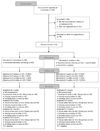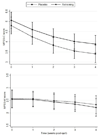Lack of attentional retraining effects in cigarette smokers attempting cessation: a proof of concept double-blind randomised controlled trial
- PMID: 25697911
- PMCID: PMC4961243
- DOI: 10.1016/j.drugalcdep.2015.01.041
Lack of attentional retraining effects in cigarette smokers attempting cessation: a proof of concept double-blind randomised controlled trial
Abstract
Background: Observational studies have shown that attentional bias for smoking-related cues is associated with increased craving and relapse. Laboratory experiments have shown that manipulating attentional bias may change craving. Interventions to reduce attentional bias could reduce relapse in smokers seeking to quit. We report a clinical trial of attentional retraining in treatment-seeking smokers.
Methods: This was a double-blind randomised controlled trial that took place in UK smoking cessation clinics. Smokers interested in quitting were randomised to five weekly sessions of attentional retraining (N=60) or placebo training (N = 58) using a modified visual probe task from one week prior to quit day. Both groups received 21 mg nicotine patches (from quit day onwards) and behavioural support. Primary outcomes included change in attentional bias reaction times four weeks after quit day on the visual probe task and craving measured weekly using the Mood and Physical Symptoms Scale. Secondary outcomes were changes in withdrawal symptoms, time to first lapse and prolonged abstinence.
Results: No attentional bias towards smoking cues was found in the sample at baseline (mean difference = 3 ms, 95% CI = -2, 9). Post-training bias was not significantly lower in the retraining group compared with the placebo group (mean difference = -9 ms, 95% CI = -20, 2). There was no difference between groups in change in craving (p = 0.89) and prolonged abstinence at four weeks (risk ratio = 1.00, 95% CI = 0.70, 1.43).
Conclusions: Taken with one other trial, there appears to be no effect from clinic-based attentional retraining using the visual probe task. Attentional retraining conducted out of clinic may prove more effective.
Clinical trial registration: UK Clinical Trials ISRCTN 54375405.
Keywords: Attentional bias; Attentional retraining; Cigarette smoking; Craving; Smoking cessation.
Copyright © 2015 Elsevier Ireland Ltd. All rights reserved.
Conflict of interest statement
Aveyard has done research and consultancy for manufacturers of smoking cessation medication. Ferguson has consulted for GlaxoSmithKline Consumer Healthcare on matters relating to smoking cessation and has received researcher-initiated project grant funding from Pfizer (through the GRAND initiative).
Figures



References
-
- Ataya AF, Adams S, Mullings E, Cooper RM, Attwood AS, Munafo MR. Internal reliability of measures of substance-related cognitive bias. Drug Alcohol Depen. 2012;121:148–151. - PubMed
-
- Attwood AS, O’Sullivan H, Leonards U, Mackintosh B, Munafo MR. Attentional bias training and cue reactivity in cigarette smokers. Addiction. 2008;103:1875–1882. - PubMed
Publication types
MeSH terms
Associated data
Grants and funding
LinkOut - more resources
Full Text Sources
Other Literature Sources
Medical

